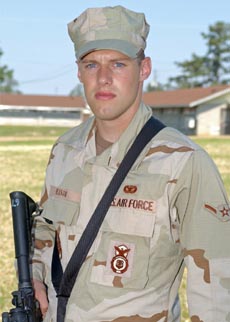
When most of us plan a trip to a foreign country, we simply find a good hotel, scout out the best shopping areas, and make sure our passport is in order. But for most military members, deploying to a foreign country such as Iraq and Afghanistan, involves a whole lot more preparation before their departure. For the son of a Spencerport couple, going through the mobilization training at Camp Shelby is probably the hardest thing that he has ever experienced. But as the trainers here like to say, "You have to sweat in training so you don't bleed in combat." Air Force Airman William C. Mason, son of William and Mary Ellen Mason, Ridge Road West, Spencerport, is a security forces member. Located 68 miles from the Gulf Coast, and about 110 miles from New Orleans, Louisiana, Camp Shelby is just outside of Hattiesburg, at one of the largest training sites in the United States. The training post has the capability to train at any given time, more than 12,000 Army, Air Force, Marine Corps, Navy, Special Operation Forces, National Guard and Reserve and joint operations personnel, like they will fight in stressful, simulated combat conditions. "I'm deploying to Camp Bucca, Iraq, to conduct joint operations and assist the Army," said Mason, a 2006 graduate of Spencerport High School. By using a technique called "theater immersion," the soldiers, airmen and sailors are put into a realistic, hands-on, theater-specific environment. They live in forward operating bases, interact with real Iraqis or Afghans and patrol and work in villages and towns designed to replicate what they will see when they deploy. This produces leaders and soldiers who are confident, competent and disciplined in their skills, knowledge and abilities. "We are training with the Army to develop an even better understanding of our jobs and expectations of us in the war zone," Mason said. "Training here has been an experience that will carry with me for my entire military career," said Mason. We constantly hear about Improvised Explosive Devices in daily television newscasts and newspaper articles because they are the number one casualty producer, and the enemy's precision weapon of choice. They are the number one priority in training. Every soldier going through training can be hit by an IED at any time and any place and may be exposed to an average of 30 IED events throughout their training. This teaches them to think quickly on their feet so they become adaptive and flexible to their environments. "The training here is important - to get us prepared for a different lifestyle in a foreign war zone," said Mason. Provided information by Dona Fair © July 8, 2007 - Westside News Inc. |
